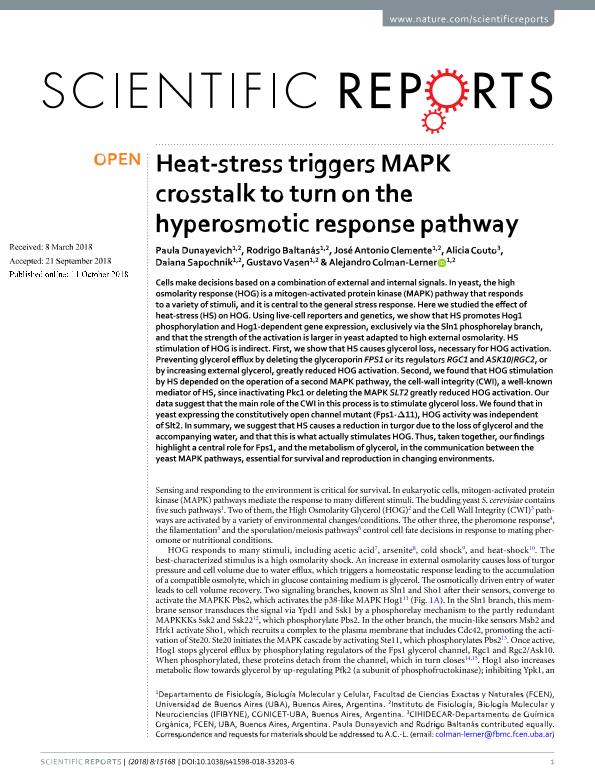Artículo
Heat-stress triggers MAPK crosstalk to turn on the hyperosmotic response pathway
Dunayevich, Paula ; Baltanas, Rodrigo
; Baltanas, Rodrigo ; Clemente, Jose Antonio
; Clemente, Jose Antonio ; Couto, Alicia Susana
; Couto, Alicia Susana ; Sapochnik, Daiana
; Sapochnik, Daiana ; Vasen, Gustavo
; Vasen, Gustavo ; Colman Lerner, Alejandro Ariel
; Colman Lerner, Alejandro Ariel
 ; Baltanas, Rodrigo
; Baltanas, Rodrigo ; Clemente, Jose Antonio
; Clemente, Jose Antonio ; Couto, Alicia Susana
; Couto, Alicia Susana ; Sapochnik, Daiana
; Sapochnik, Daiana ; Vasen, Gustavo
; Vasen, Gustavo ; Colman Lerner, Alejandro Ariel
; Colman Lerner, Alejandro Ariel
Fecha de publicación:
12/2018
Editorial:
Nature Publishing Group
Revista:
Scientific Reports
e-ISSN:
2045-2322
Idioma:
Inglés
Tipo de recurso:
Artículo publicado
Clasificación temática:
Resumen
Cells make decisions based on a combination of external and internal signals. In yeast, the high osmolarity response (HOG) is a mitogen-activated protein kinase (MAPK) pathway that responds to a variety of stimuli, and it is central to the general stress response. Here we studied the effect of heat-stress (HS) on HOG. Using live-cell reporters and genetics, we show that HS promotes Hog1 phosphorylation and Hog1-dependent gene expression, exclusively via the Sln1 phosphorelay branch, and that the strength of the activation is larger in yeast adapted to high external osmolarity. HS stimulation of HOG is indirect. First, we show that HS causes glycerol loss, necessary for HOG activation. Preventing glycerol efflux by deleting the glyceroporin FPS1 or its regulators RGC1 and ASK10/RGC2, or by increasing external glycerol, greatly reduced HOG activation. Second, we found that HOG stimulation by HS depended on the operation of a second MAPK pathway, the cell-wall integrity (CWI), a well-known mediator of HS, since inactivating Pkc1 or deleting the MAPK SLT2 greatly reduced HOG activation. Our data suggest that the main role of the CWI in this process is to stimulate glycerol loss. We found that in yeast expressing the constitutively open channel mutant (Fps1-Δ11), HOG activity was independent of Slt2. In summary, we suggest that HS causes a reduction in turgor due to the loss of glycerol and the accompanying water, and that this is what actually stimulates HOG. Thus, taken together, our findings highlight a central role for Fps1, and the metabolism of glycerol, in the communication between the yeast MAPK pathways, essential for survival and reproduction in changing environments.
Palabras clave:
Signal transduction
,
Cross-talk
,
Yeast
,
High osmolarity
Archivos asociados
Licencia
Identificadores
Colecciones
Articulos(CIHIDECAR)
Articulos de CENTRO DE INVESTIGACIONES EN HIDRATOS DE CARBONO
Articulos de CENTRO DE INVESTIGACIONES EN HIDRATOS DE CARBONO
Articulos(IFIBYNE)
Articulos de INST.DE FISIOL., BIOL.MOLECULAR Y NEUROCIENCIAS
Articulos de INST.DE FISIOL., BIOL.MOLECULAR Y NEUROCIENCIAS
Citación
Dunayevich, Paula; Baltanas, Rodrigo; Clemente, Jose Antonio; Couto, Alicia Susana; Sapochnik, Daiana; et al.; Heat-stress triggers MAPK crosstalk to turn on the hyperosmotic response pathway; Nature Publishing Group; Scientific Reports; 8; 1; 12-2018; 15168-15183
Compartir
Altmétricas



